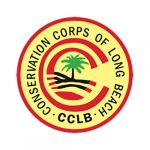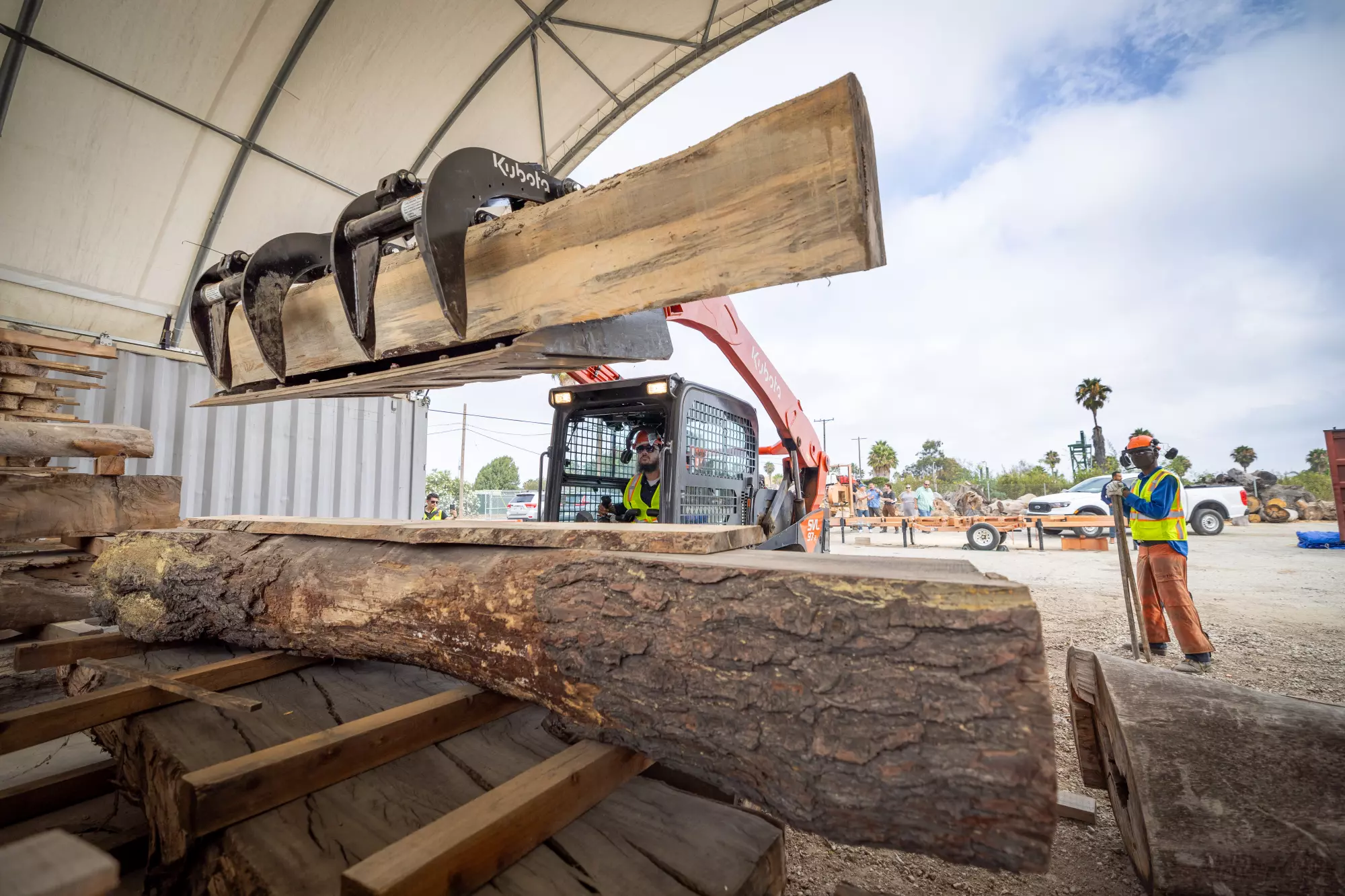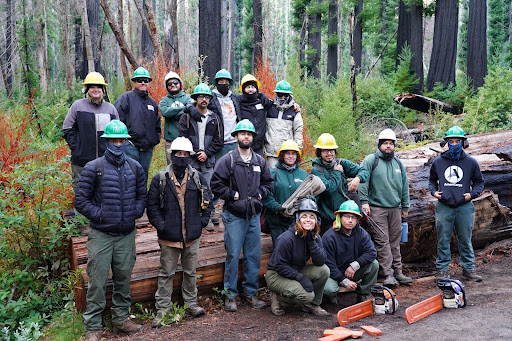
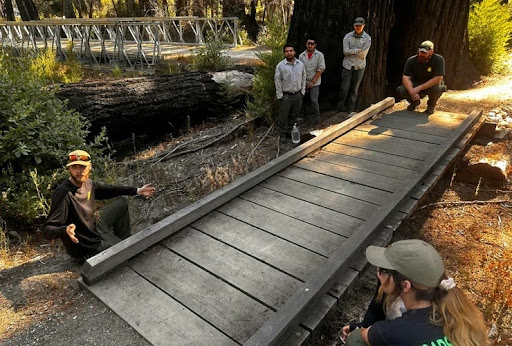
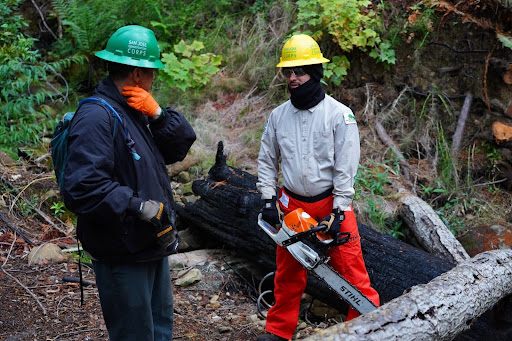
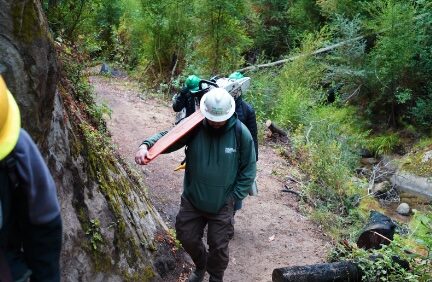
Restoring Big Basin State Park
In 2020, the CZU Lightning Complex Fire severely damaged the trails within Big Basin State Park, California’s oldest State Park. Over 97% of the park burned, destroying infrastructure, historic old-growth trees, and trails. Since then, State Parks, the California Conservation Corps, and other organizations have undertaken fuel reduction and trail reconstruction efforts to restore the park to pre-fire conditions.
From June 2024 to November 2024, San Jose Conservation Corps crews have been working with State Parks trail staff for ten back-to-back marathon work sessions, known as “spikes.” These were eight-day trips where 12 corpsmembers and two supervisors would camp out in the park and work on the historic trails within Big Basin.Corpsmembers began to help the park recover from a local disaster. Corpsmembers cleared out hazardous trees, brush, wood debris, and cut down overgrown vegetation that had appeared in the years since. They also built bridges to further enhance the trails, so all Californians can once again enjoy the park and its natural beauty. Thank you State Parks and the CCC for your guidance and support!
Urban Lumber Program
The Conservation Corps of Long Beach has developed an Urban Lumber Program in an effort to remove 1,000 dead, dying and diseased trees. The nonprofit organization is also helping connect youth 18 to 26 years old with job skills and training. “It’s going to be our corps members who are going to be developing furniture or pieces that will generate revenue for the program to continue existing,” said Javier Valladares, director of construction training with the Conservation Corps of Long Beach.
Cal Fire is giving a $1 million grant to fund this training program, which is a collaboration with the Conservation Corps of Long Beach, the City of Long Beach’s Public Works Department and West Coast Arborists.”The difference between forced cut lumber that you find in Home Depot, Lowes or big box stores is it’s all cut down for the value of its timber. We’re utilizing trees that would just go to a landfill, restoring the carbon and also beautifying the city back with trees that were grown in it,” said Jason Rose, foreman with West Coast Arborists.
Check out the video
Dodgers Day of Service
In August, over 100 volunteers from the Dodgers worked alongside our crews in the neighborhoods surrounding Dodger Stadium. They picked up trash and removed overgrown weeds, leaving a major impact on the community. Not to mention the generous donation the Dodgers made to support our work throughout the city. We are incredibly grateful to partner with the Dodgers, and we don’t know what you think, but we sure think Dodger Blue and Corps Green look good together. Check out the photo highlights above!
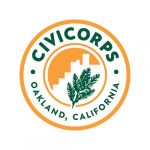
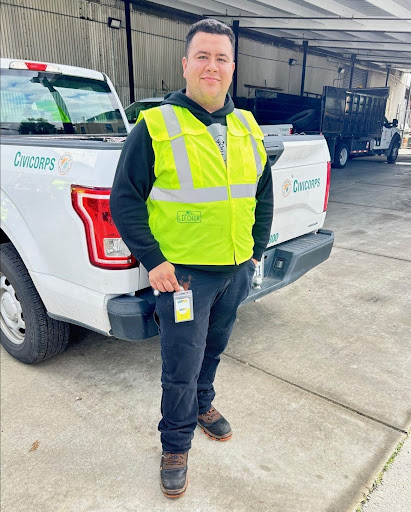
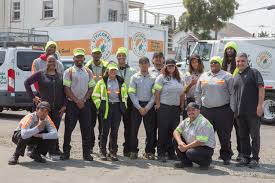
Civicorps Recycling Program
Civicorps Recycling provides single stream collection services to over 1,200 businesses in Oakland, collecting 166 tons of recycling materials and 11 tons of E-waste every month? Recycling Interns who are on a pathway to become commercial truck drivers perform seven daily routes. Civicorps pays for all training hours on the road, behind-the-wheel training, and in the classroom. Once our Interns get their Class B commercial driver’s license, they’re eligible to transfer to Waste Management as a Teamster apprentice. Former Recycling Intern, Santiago Galvez-Flores this year was promoted to an apprenticeship with WM. After training with Civicorps for two years, Santi was selected for this highly competitive position. Keep an eye out for Santi in his WM truck and be sure to give him a wave!

Urban Forestry Training and Partnership
SCMF’s Urban Conservation Corpsmembers received training and assisted with urban forestry efforts in partnership with Jardin de la Salud, community garden in the City of San Bernardino. A Special thanks to our partnership with Jardin de la Salud and Kevin the local Master Gardener for working with our team. This program is essential to introducing the next generation to urban forestry, creating leaders of tomorrow within their local communities.
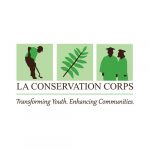

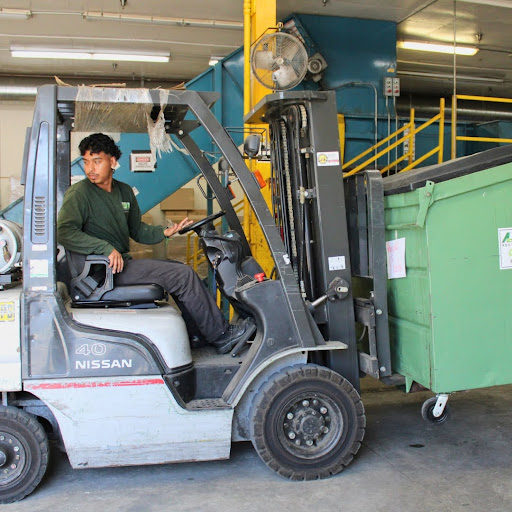
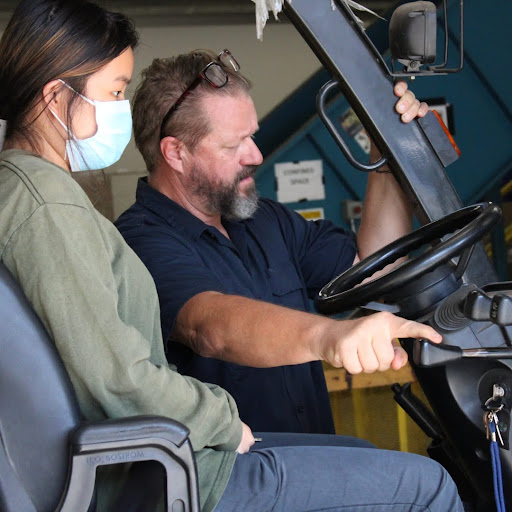
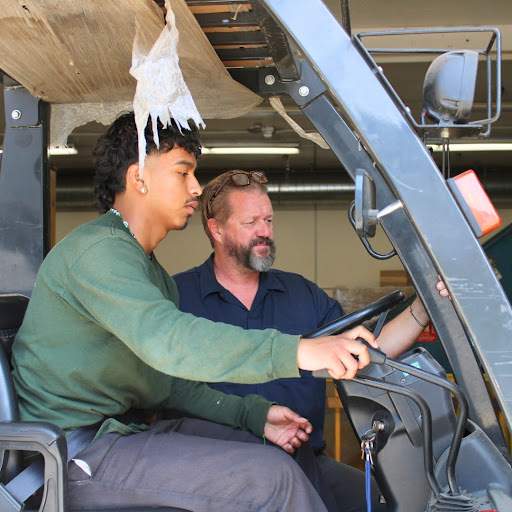
Forklift Certification Program
Corpsmembers from across Los Angeles County have been participating in forklift training at the Los Angeles Conservations Corps’ Northeast LA site. This training ends with an industry-recognized certification that opens doors to a variety of career pathways for Corpsmembers. They start in the classroom, and then they apply the skills they’ve learned, with an eye toward continued growth and advancement. Forklift certification typically involves a written test and a skills test to demonstrate safe operation. The certification, which must be renewed every three years, can lead to more job opportunities and higher salaries. Thank you to our funders for supporting transformative programs like this one that impact the lives of young Californians every day.


Edible Food Recovery Program
Since the very first trip of Conservation Corps of North Bay’s Edible Food Recovery Program – made possible by a refrigerated truck purchased with a grant from Zero Waste Sonoma – CCNB has helped divert thousands of pounds of food from landfills and onto the tables of people surviving food insecurity. Their rapid growth represents an invaluable service to local communities and Corpsmembers alike!.
In just 6 months, Zero Waste crews were able to recover over 100,000 pounds of food! From packaged food, meat, fish and poultry, to baked goods, beverages and desserts, this impressive number of recovered foods also represents valuable training hours in food handling for Corpsmembers—another skill they can add to their tool belt.
Most of the food comes from Tier 1 generators—large grocery stores such as Whole Foods, Safeway, Nugget Markets—and is distributed locally within Sonoma County. Some of our partners include Redwood Empire Food Bank, ExtraFood, Farm to Pantry, and Una Vida.
CCNB handles and distributes the food collected during 4 to 5 collection routes weekly. Contingent on continued funding, the Zero Waste Department is looking to expand services to local school districts to repurpose edible food from lunch programs.
The Edible Food Recovery program is an exciting addition to Zero Waste’s efforts to divert materials from the landfills, and at the same time assist in the fight against food insecurity in California communities and help Corpsmembers grow a variety of skills for their future.


